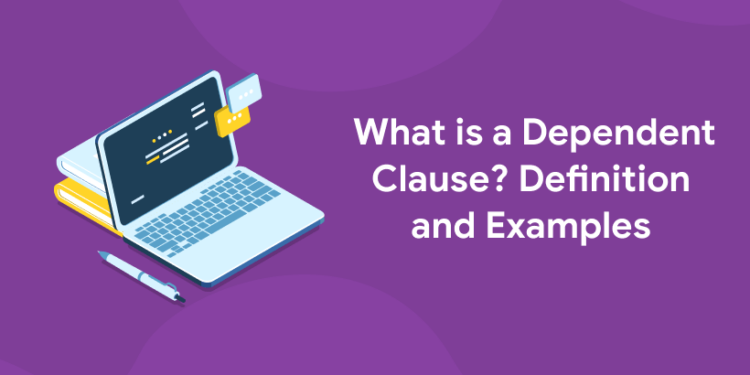Table of Contents
A clause is a set of words that includes a subject and a verb that is related. This link is critical; rather than being a random arrangement of words, a phrase contains information about what the subject is or is doing. A clause can often—but not always—function as a standalone sentence because it expresses an action or a state of being. A sentence may have one or more clauses. A clause’s only distinguishing feature is that it must have a linked subject and verb. Clauses play many different roles in English, thus there are many different ways to arrange and combine them.
Click here to learn more about English grammar courses for 2022
There are two types of clauses.
- Dependent clauses
- Independent clauses
Click here to learn more about dependent clauses and their types
What is a Dependent Clause?
A dependent clause (or subordinate clause) is a clause that, because it does not express a complete thought, cannot stand alone as a complete sentence. A dependent clause does not form a complete sentence. Subordinate clauses are another name for dependent clauses. These clauses, as the name implies, rely on independent clauses to express ideas clearly. A dependent clause, like all clauses, has a subject and a verb.
Register to learn about articles in English grammar
Definition of Dependent Clause
1: Which of the sentences below is grammatically correct?
Dependent clauses are clusters of words with a subject and a verb but no complete thought. Dependent clauses, commonly referred to as subordinate clauses, rely on independent clauses for meaning.
Sign up for notes on the active and passive voice of English grammar
Types of Dependent Clauses
The dependent clause can be divided into 3 subtypes. You can tell what type of clause something is by how it works in the sentence.
- Adjective Clause- Adverb clauses begin with subordinating conjunctions and modify verbs. Adverbial clauses answer wh- questions such as when, where, and why something happened, as well as how and to what degree something happened.
- Adverbial Clause- Adjective clauses modify nouns and are normally preceded by a relative pronoun and, on rare occasions, subordinating conjunction.
- Noun Clause- Noun clauses refer to a specific person, place, thing, or concept. It can be a subject, object, subject complement, object complement, or appositive because it functions as a noun.
Register to watch video lessons for subject-verb agreement
Some examples of different types of dependent clauses are given below.
| Type of dependent clause | Example |
| Adjective Clause | · Which is located in Italy
· Who is smart · Who live by the market · Where I went to primary school |
| Adverbial Clause | · When the principal arrives
· If you can study on Mondays · Whenever you leave for work · Unless you have the exact colour |
| Noun Clause | · Why did he say that
· If the dress is at discount · What he expected · Whether she can drive that long |
Click here to get the best classes to learn reported speech for English grammar
Location of Dependent Clauses in a Sentence
Although there are exceptions, a comma normally follows a dependent clause at the start of a sentence (as in this sentence). When a dependent clause appears at the end of a sentence, it is usually not preceded by a comma, however, there are exceptions (as in this example). They can be seen inside other dependent clauses as well.
Click here to get more practice questions on different types of dependent clauses
Dependent Clause Examples
Dependent clauses General examples are provided here for practice. Dependent clauses are provided in italics for easy comprehension.
- When the train stop, we will get off it.
- Because I cannot attend the concert, you can have my entry pass.
- She can write much more skillfully than her friends can.
- If you study on Thursday, I will clean the room for you.
- You can stay in my spare room, whenever you are in the city.
- I am not completely sure how he won the competition.
- This is the dog that has gone missing.
Click here to get mock tests on types of dependent clauses
- Winter is the time when the snow falls on the trees.
- My brother is the one who stays in that cottage.
- These are the folks who we met on vacation.
- My mother didn’t tell me why she said those things.
- They were lost and were not certain how they would find their way.
- What he thought was not what happened.
- My sister doesn’t know if she can drive there.
- We will give the finest seats to whoever reaches the earliest.
- What the girl did was not beneficial to the state of affairs.
- The trophy will be given to whoever wins the competition.
- He finally finished his engineering course after many years of studying.
- Where is the bread which was on the shelf?
- The actress, who starred in the movie, was very gifted.
- The cycle which you saw belongs to my daughter.
- Whenever I am in London, I speak English.
- If you can give me a decent reason, I will let you borrow my bike.
- When the bus returns, we can go back to the hotel.
- Because my alarm did not work this morning, I was late for school.
- When we turned up at the celebration, we were offered a beverage.
Click here for brief notes on the types of dependent clauses
The article above has discussed all major details about the types of dependent clauses and dependent clause examples. Download the Entri app to polish your English grammar skills for exams and interviews in 2022.










